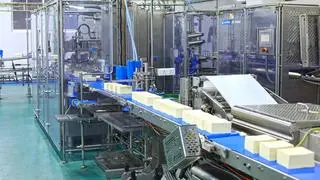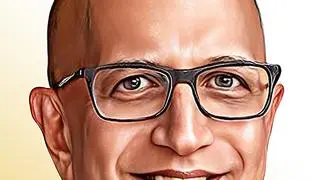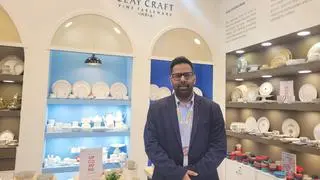Sanjiv Mehta is unfazed by crises even as he admits that the Covid-19 pandemic was sweeping in its dimension as a health, economic and societal crisis all rolled into one. Mehta, 61, Chairman & Managing Director of consumer goods behemoth Hindustan Unilever, and a 29-year veteran of the multinational, has confronted many cataclysmic events right through his career.
Within a year of joining his first job at Union Carbide, “it was a baptism by fire for me when I was sent to Bhopal to be a part of the crisis team.” The Bhopal gas tragedy had occurred in December of 1984 and he saw the crisis at close quarters. “How do you react to a crisis? How do you lead a team? How do you engage with the communities during the crisis? So a lot of things got instilled in me during those days,” he recalls. Later, he was Chairman of Unilever, Bangladesh, during the second Gulf War. “There was a lot of antagonism against Western companies because there was the feeling that the war was unjust, unfair. And we were the lightning rod being one of the largest multinational Western companies in the Bangladesh, so one had to steer that,” he says. When he was Chairman of Unilever for North Africa and the Middle East, it was the Arab Spring, which engulfed the entire region.
We are conversing with Mehta virtually on his life and times as the pandemic has put paid to a convivial chat over a meal. Mehta, sipping coffee from a mug with Bru emblazoned on it, recalls that during the Arab Spring, there was sheer anarchy in Egypt, where Unilever had a huge operation. To keep the business going, Mehta said they did many things which were counter-intuitive, “but at the core of it was looking after our people.”
Mehta says they asked the company wholesalers in Egypt to loan whatever spare cash they had and the company in turn distributed it to loaders, salesmen and others in the system in need. They collected food and brought it the factories. “The factories were being burned down. It was our own workers, three shifts a day, who were protecting the factory,” he says. Mehta also asked the Cairo-based managing director to increase ad spends and distribution of Unilever products and the group emerged out of the crisis with double digit growth.
Jewel in the Unilever crown
Mehta’s Unilever journey, transitioning to larger roles and responsibilities – from Bangladesh to Philippines and then the MENA region, which comprised 20 countries from Oman in the east to Morocco in the west – meant, in Mehta’s words, that “Unilever had been getting me ready for bigger roles. So, if a crisis hits, it doesn’t faze me.” HUL, after all, is the jewel in the Unilever crown. One thing seared into Mehta’s memory from his earlier stints was that if you look after the people, they will look after the business.
During the first lockdown due to the Covid-19 pandemic, while most were safely ensconced in homes, the HUL factories kept humming as soaps and sanitisers were needed. Mehta kept visiting his factories to talk to the workers. The greater purpose of continuing to work hard in the midst of the pandemic was well articulated to Mehta by a worker on one of his factory tours, when he told him, (Sir, the soaps that I make helps protect the country),” recalls Mehta. That soaps and handwashing were one of the life savers during the pandemic was drilled into everyone. “A humble factory worker telling you that he makes soaps to help save the nation, that’s what makes you walk that extra mile,” adds Mehta. “Sahab me to sabun banata hu, isse desh ki suraksha hoti hai
Mehta took over as Chairman in October 2013 when HUL had a market cap of just over ₹1 lakh crore. HUL has now hit ₹ 6.5 lakh crore in market cap in less than 8 years. Ask Mehta about HUL watchers observing that he was not a typical HUL head as he is an accountant and not an MBA, he bristles just a little. “Well, those people who made the statement did not know me. You need to have a very good understanding of different levers of business. In my career, though I’m a chartered accountant by training, I’ve worked in sales, in marketing, in supply chain, in mergers and acquisition… so I have worked in different domains, besides my core skills of accounting and finance. And before I came into India, I had already been a Chairman of different Unilever companies for 11 years. So in many ways, I had been trained by Unilever to come and head Unilever’s crown jewel. And the other important bit is, I am completely Indian at heart.”
Mehta also points out that as a Mumbaikar, all his formative years of school, college and CA articleship were in India. “And even when I was out of the country for 21 years, I always read about India, was completely clued on, and visited almost every year.”
Reimagining HUL
Successive chairmen of HUL have been reinventing the company for their times. On Mehta’s plate now is the reimagine HUL agenda. “It’s part of the journey to ensure you remain relevant to the context,” explains Mehta. The work on reimagining HUL began around five years ago. While this was all about bringing data and technology centre-stage, the pandemic accelerated the journey. One of the prongs was the Shikhar app where a retailer can place an order for goods even when a salesman cannot visit. Pre-pandemic it was tough to convince retailers but now the trend of retailers taking to the app has gained speed, with more than half-a-million outlets adopting the app. “Pre-pandemic, we were getting the total demand capture digitally which was about three per cent of our turnover. Now, it has reached about 10 per cent. So, for us reimagining HUL is not just about e-commerce or digital marketing. It is looking at the whole value chain and asking ourselves, ‘How can data, technology help us become more effective and more efficient?’ And instead of a linear value chain, we are now creating ecosystems of consumers, customers and operations with data and technology,” he elaborates.
In 2015 HUL unveiled a concept called winning in many Indias, which started by recognising that India is not a homogeneous entity and you cannot have one strategy in the country. “So, we broke up India into 15 clusters, which were relatively homogeneous. Our strategy and execution today is distinct for each cluster. The strategy in Tamil Nadu will be very different from the strategy in UP or Bihar. The per capita consumption is different, the categories are in a different stage of evolution, the competitors are different. So what this did was this brought in a level of complexity. But I always treat it as high density lipoprotein (HDL), the good cholesterol,” he says, laughing. Earlier, a HUL brand manager or category head used to make one pan-India strategy. “Now we were asking him to make 15 strategies. This couldn’t work unless you provided him with data, technology and analytics. Now a chief data officer is a part of my top leadership table. The pandemic has accelerated our reimagine HUL journey,” adds Mehta.
Early life in Mumbai
We ask Mehta about his early life in Mumbai and the homecoming to the city he grew up in. Mehta avers that his is a quintessential Indian middle class family; his parents grew up in a part of Punjab which is now in Pakistan, close to Lahore. They migrated to Kanpur having lost nearly everything. Mehta’s father started working while he was still studying and qualified to join the Reserve Bank and moved the family to Mumbai. “So I was a middle class boy from Mumbai, who loved playing cricket and grew up in a family where the values of hard work, integrity and education were ingrained in us very early in life. And those have held us in good stead. And I think to a large extent, we were influenced by our Dad,” reminisces Mehta.
Mehta had aspirations to be a cricketer and had moved to Bhadra High School, among the best schools in Mumbai for cricket. But, he soon realised that he didn’t have the talent to make it big; but he had a head for numbers, which led him on to the path to be a CA. But, he continued a cricket connection as he did his articleship under NKP Salve, former Union Minister and a former president of the BCCI. Among the toppers in the CA exam, Mehta had plum offers coming his way: Unilever offered him a job with Lipton in Kolkata while Union Carbide had one for him in Mumbai, so he plumped for the latter. But, serendipitously, he was to join Unilever later.
Mehta’s wife, Mona, is a CA as well, but, as Mehta points out, she’s a corporate banker and not in a consumer goods company. “While our educational background is similar, I think we are pretty diverse individuals, but with similar set of values. And our daughters are not following our footsteps,” says Mehta, with a fond smile. Their twin daughters, Naina and Roshni, are both studying in the US, the former at Harvard Business School and Roshni in a dual master’s programme at Harvard Kennedy School. Ask Mehta if it was tough brining up twins, he says, “The first one year is tough, because it’s a multiplier impact. One baby would sleep, the other would get up. And we didn’t have our mothers with us. But, thankfully, we got some very good help. And after the one year, then it became lovely. You know, it’s a very special bond that twins have, which is very exceptional.” Our one hour with Mehta is up and brings to a close a conversation as stimulating as the Bru coffee Mehta has been sipping.








Comments
Comments have to be in English, and in full sentences. They cannot be abusive or personal. Please abide by our community guidelines for posting your comments.
We have migrated to a new commenting platform. If you are already a registered user of TheHindu Businessline and logged in, you may continue to engage with our articles. If you do not have an account please register and login to post comments. Users can access their older comments by logging into their accounts on Vuukle.